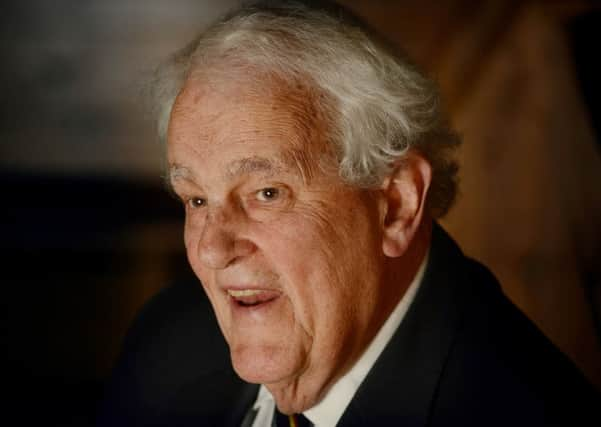Darren '˜Loki' McGarvey: Dalyell's independent mind gives strength to all


Others, by his weird sounding surname which, depending on who you were talking to, didn’t always seem to correspond with how it was written – making it hard to say in company for fear of looking a bit stupid. But like his surname, and many of the issues he stood for, most people with even a passing interest in Scottish politics will have a sense of Tam Dalyell’s political legacy, even if they can’t remember exactly what it means.
The phrase ‘West Lothian question’ was first coined in 1977 by Ulster Unionist MP Enoch Powell in response to Tam Dalyell, who correctly observed the democratic paradox that MPs from Northern Ireland, Scotland and Wales, could vote on matters affecting England, while English MPs could not vote on matters that were devolved.
Advertisement
Hide AdAdvertisement
Hide AdThe phrase quickly became etched in the Scottish cultural mind: appearing in the school curriculum as well as becoming the gold-standard reference point for people engaging in constitutional debate – which was, again, occurring with increasing frequency and rigour by the time Scottish Parliament was reconvened in 1999. This central irony at the heart of devolution is a conundrum still waiting to be reconciled, the latest attempt being English Votes for English Laws.
But regardless of your political leanings, or opinion on the constitutional issue itself, we should all share an appreciation for the insight that independent thinkers like Dalyell can offer – even if we disagree. The West Lothian question, regarded as common knowledge nowadays, zoomed in on a fundamental contradiction at the heart of a prevailing idea which had, thus far, eluded everyone else. Dalyell’s question forced us to reconsider a principle, in this case democracy, from a completely different angle and his observation reframed the issue for subsequent generations.
This process of observing, formulating and feeling free to express a challenging idea is essential in a democratic society. The West Lothian question may not be as glamorous – or mythical – as Aristotle’s wacky contention that the world was spherical and not flat, but both observations were a by-product of the same human attribute that can drive civilised societies forward: independent mindedness.
In an era where much kudos and self-satisfaction awaits those demonstrating their unwavering commitment to the prevailing dogma of the day, wherever on the spectrum or axis they may reside, independent thinking, and the courage to express it, is dwindling in the cacophony of angry moral certainty.
You’ve been there yourself. Halfway through typing your hot take on the issue of the day, but end up just deleting it because you realise the futility of barking into that unforgiving vacuum.
If this is even remotely the case for you then you will already know that being independently minded is a lonely and frustrating place to be. There is no instant gratification from a carefully curated newsfeed to embolden you to speak and be heard. Instead, only a feeling of alienation, disillusionment and quiet horror as reality itself appears to be coming undone.
It’s a confusing time to be alive.
Tam Dalyell, stoic as he appeared, must have felt unsure of himself at various points in his storied life despite his apparent moral fortitude. You cannot claim to deeply consider anything at all if your own absurdity and fallibility does not cross your mind at least once a day. But don’t let the humility that you don’t have all the answers prevent you from speaking up. Dalyell refused to self-censor and continued to form his own opinions, independent of the tribe, even in the twilight of his own life, when he could probably have done without the hassle.
On 19 September 2014, in an interview with Kirsty Wark, the Labour MP utterly eviscerated unionist party leaders who fashioned the infamous ‘Vow’, which he thought disingenuous and unworkable. He even questioned the legitimacy of Gordon Brown’s decisive intervention in the days before the fateful plebiscite and did so despite being a staunch unionist. Yes, throughout his life Dalyell’s intellectual autonomy was aided partly by his personal wealth, insulating him from the ideological pragmatism that subtly governs the direction of our own lives, but nonetheless, he followed his own lines of inquiry and pursued his own agendas – making no apologies for it.
And neither should you.
Advertisement
Hide AdAdvertisement
Hide AdWe wouldn’t get much done if we just roved around the world as ponderous individuals all the time, that much is true. And it’s also the case that sometimes we must stop the chin-stroking, roll up our sleeves and get our hands dirty by occasionally punching a Nazi in the face. But the cornerstones of our democracy, freedom to collectivise and freedom to express our views as individuals, are equally redundant without that crackle of tension between them. A friction that, while deeply unsettling, often produces the sort of flying sparks that can bring a confusing world into sharp focus. Which is why we should hold Tam Dalyell in the highest possible regard. And while we may not be able to emulate his powers of observation (or lack of concern for what others think of us) Dalyell’s memory acts as a beacon of encouragement to all who are, in a cauldron of unending moral certainty, increasingly afraid to speak their minds – or to be caught thinking at all.